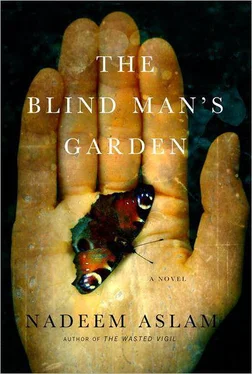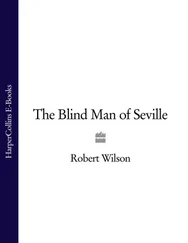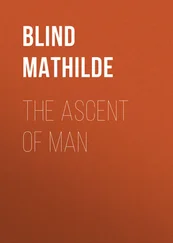The young men watch him from a distance, from various corners of the house, gathering in groups here and there and withdrawing, and he makes sure not to meet anyone’s eye. As he eats Fatima tells him that the school will open at eight thirty and that the teachers should begin to arrive around eight.
At seven forty-five Fatima’s sister puts on her burka and her husband unlocks the main door and she goes out to the school to position herself outside the gate, to wait for the arrival of the English-speaking teacher.
Mikal enters the garage and approaches the back of the pickup and lifts the tarpaulin flap. The soldier, blindfolded, senses someone’s presence and moves his head. His arm is in plaster and is nestling in a triangular sling of white muslin that was once a flour sack. He is wearing a new set of shalwar kameez and there is a large saffron and black bruise on his forehead. Mikal feels he is watching him through the blindfold, perhaps through the round naked discolouration above the eyes. The street is just on the other side of the garage and from it comes the chatter of the schoolchildren arriving for a day of learning.
He hears the front door being opened and looks out of the garage to see Fatima’s sister coming in with another, much slimmer figure. Her burka is tighter than the older woman’s, with long clean lines, and she has a leather handbag slung over her shoulder and her feet make clicking noises he hasn’t heard from the women in this house. Sturdy and purposeful, as opposed to the maternal and domestic shuffling that comes from the others. He watches them disappear towards the kitchen.
Five minutes later the man comes out to Mikal. ‘The girl knows English but refuses to speak to the American. She’s too afraid. She says they’ll cut off her tongue, or she’ll be killed outright.’
‘Can’t you persuade her?’
‘We are trying.’
‘What happened to his forehead?’
‘I told you. He struggled when we were cleaning him. Threw us around everywhere and got tangled up in the chains.’
‘I thought it might have something to do with what’s written on his back.’
‘It isn’t. But I’ll tell you one thing. He’ll pay for that piece of poetry if he is caught by someone out there.’
The man goes back into the house and returns a few minutes later. ‘She’s terrified. She is about to leave.’
Mikal steps out of the garage to see the girl hurrying across the courtyard, sobbing loudly inside her black burka. He moves towards her with one arm extended and says, ‘Sister, listen —’
But she gives a squeal at his approach and he stops.
The father unlocks the door and just as the girl steps out two of the servants make a dash for it and leave the house, pushing the man aside. High-pitched screams and shouts come from outside as the two escaping men crash into children. The man of the house scrambles up and locks the door once again.
Everyone is stunned.
‘They are afraid the Americans will raid the house and carry them off,’ says one of the other servants.
‘They will tell everyone in the bazaar,’ the son says. ‘In half an hour every man in Allah-Vasi whose honour, faith and manhood is still intact is going to descend on this house.’ He comes forward and strikes Mikal hard on the face. ‘Get out of here. Go.’
The father doesn’t say anything or reprimand the boy.
‘I’ll take him away.’ Mikal nods. ‘I’ll leave.’
Taking a cigarette lighter from his pocket and flicking it alight the son begins to burn a piece of paper with it. Only too late does Mikal realise that it is the American soldier’s blood chit.
‘We don’t want you bringing the Americans into this area,’ the son says, letting go as the flame creeps towards his fingertips. The last small piece of whiteness falls to the ground with the flame still attached. It is ash by the time it lands. ‘We are keeping the Kalashnikov and the bullet-proof vest and the dollars,’ he adds. ‘The tarpaulin isn’t cheap.’
‘You can keep the pistol for your protection, and also his food,’ the father says.
‘I want the snow leopard too,’ says the son.
‘The cub is mine,’ Mikal says as vigorously as he can.
The father looks at the son. Then at Mikal. ‘You can take the cub with you.’
Mikal turns to leave the room.
‘You said you needed to make a phone call,’ says the father. He points to a door. ‘The phone is through there.’
There is no answer from Heer. Mikal hangs up and dials a second time but again no one picks up.
Five minutes later he is easing the pickup out of the garage, the father walking beside the vehicle.
‘Where will you go?’ Fatima appears on the veranda.
‘I don’t know. I think I’ll go to Megiddo. Hide him in the house and go to the school there and try to find a teacher who speaks English.’
‘Just leave him in the desert and move on,’ the man says. ‘Go home. Do what other young men do, watch films and apply for jobs and quarrel with your sisters.’
‘He knows what happened to Salomi and to Akbar’s brother.’
‘I’ll come with you,’ Fatima says.
‘No,’ says her brother-in-law, raising his hand in the air.
‘That’s not a good idea,’ Mikal says gently.
‘If I am in the vehicle with you, there will be less chance of you being harassed. They’ll respect a woman.’
‘Fatima,’ her brother-in-law says. ‘If they find out who he’s got tied up in the back, it’s not going to matter who he has sitting with him in the front.’
The leopard is curled up in his lap, yawning to show its pale pink tongue, the thick tail twitching in the air. Mikal has a large lunch tied up in a cloth on the passenger seat, along with three Nestlé bottles filled with tap water. There is a bottle of dark brown bitter-smelling oil for the American’s arm, though when he is supposed to rub it on he doesn’t know, since the plaster cast should stay on for days.
‘Be careful,’ the man says with feeling, just before letting him out.
‘Thank you, uncle. And I am sorry.’
‘I was thinking of letting them deal with him during the night. To save you from yourself.’
‘I know.’
‘Maybe I should do it right now.’
‘I’d better go, uncle.’
‘Fine. Stay off the road. Go through the desert and keep the Pahari hills on your right. It’ll take longer but it’s the safer way. When the road floods people often cut through the desert so it can be done. I have done it myself. And now I am beginning to think you should wait till nightfall.’
‘No. I need to end this as soon as possible so I can go back to Heer.’
Children are walking towards the school, and at the crossroads at the end of the street he stops to let a dozen of them pass. A boy, carrying a bag of books twice the size of his torso, reacts to the sound of chains coming from the other side of the tarpaulin and thumps Mikal’s door. ‘What’s in the back?’
Mikal sits with his arm out of the window.
‘Is it a calf or a goat?’
‘It’s my brother. It’s his wedding day but he doesn’t want to get married, so I have tied him up and am taking him to the bride’s house.’
*
Noon finds him in a burning plain, the bare crust of the earth enclosed by the rim of hills which the sun illuminates while blinding the onlooker. He keeps a constant watch behind him in the rearview mirror in case he is being followed. To the west of him a pall of dust travels horizontally along the ground and then curves upwards obeying some law of wind he doesn’t know, and the hills are pale in the stark light, standing with cruel dignity and grandeur, and the wheels of the pickup crunch over the desert floor, the heat coming in gusts as though the rocks are breathing. It is a reminder that, in contradiction to the Koran, there are some places on earth over which man has no dominion. He drives into the terraceland of low hills eroded by the wind and drives through a pass in the blazing light, looking again and again at the temperature gauge. Soon it is displaying hot, too hot, and he imagines coolant bubbling out of the top of the radiator header tank, the vehicle overheating.
Читать дальше












